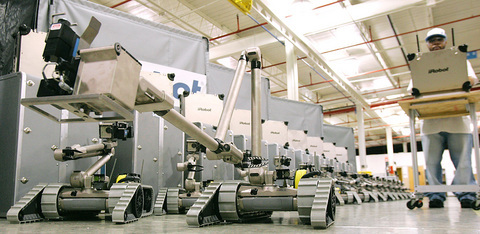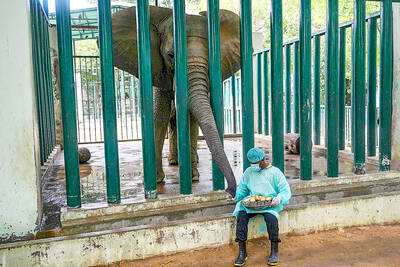The US military -- increasing its reliance on robots in war -- will soon be using explosive-sniffing robots to better detect roadside bombs which account for more than 70 percent of the US casualties in Iraq.
Fido is the first robot with an explosives sensor integrated into its body. iRobot Corp is filling the military's first order of 100 in Dayton, Ohio, and will begin shipping the robots over the next few months.
There are nearly 5,000 robots in Iraq and Afghanistan, up from about 150 in 2004. Soldiers use them to search caves and buildings for insurgents, detect mines and ferret out roadside and car bombs.

PHOTO: AP
As the war in Iraq enters its fifth year, the US government is spending more money on military robots and the two major US robot makers have increased production.
Foster-Miller Inc, of Waltham, Massachusetts, just delivered 1,000 new robots to the military. iRobot, of Burlington, Massachusetts, cranked out 385 robots last year, up from 252 in 2005.
The government will spend a total of about US$1.7 billion on ground-based military robots between fiscal 2006 and 2012, said Bill Thomasmeyer, head of the National Center for Defense Robotics, a congressionally funded consortium of 160 firms, universities and government labs. That's up from US$100 million in fiscal 2004.
Fido, produced at the GEM City Manufacturing and Engineering plant in Dayton, represents an improvement in bomb-detecting robots, said Colonel Terry Griffin, project manager of the Army and Marine Corps Robotic Systems Joint Project Office in Alabama.
The bomb-sniffing sensor is part of the robot, with its readings displayed on the controller along with camera images. Otherwise, a soldier would have to approach the suspicious object with a sensor or try to attach it to a robot. The new robot also has a 2m-long manipulator arm so it can use the sensor to scan the inside and undercarriages of vehicles for bombs.
Officials would not release details of how the sensors work because of security concerns.
"The sniffer robot is a very good idea because we need some way of understanding ambiguous situations like abandoned cars or suspicious trash piles without putting soldiers' lives on the line," said Loren Thompson, defense analyst with the Washington-based Lexington Institute.
Philip Coyle, senior adviser to the Center for Defense Information in Washington, said the robots could be helpful if they are used in cases where soldiers already suspect a bomb.
But he said explosive-sniffing sensors are susceptible to false positives triggered by explosive residues elsewhere in the area, smoke and other contaminants.
Thompson said all military robots have limitations. Their every move must be dictated by an operator, they can be stopped by barriers or steep grades, they are not highly agile, and they can break down or be damaged, he said.
Robots range in size from as little as 700g to 50kg versions that can move rubble and lift debris. Fido is an upgrade of PackBot, a 23.6kg robot with rubber treads, lights, video cameras that zoom and swivel, obstacle-hurdling flippers and jointed manipulator arms with hand-like grippers designed to disable or destroy bombs.

NO EXCUSES: Marcos said his administration was acting on voters’ demands, but an academic said the move was emotionally motivated after a poor midterm showing Philippine President Ferdinand Marcos Jr yesterday sought the resignation of all his Cabinet secretaries, in a move seen as an attempt to reset the political agenda and assert his authority over the second half of his single six-year term. The order came after the president’s allies failed to win a majority of Senate seats contested in the 12 polls on Monday last week, leaving Marcos facing a divided political and legislative landscape that could thwart his attempts to have an ally succeed him in 2028. “He’s talking to the people, trying to salvage whatever political capital he has left. I think it’s

Polish presidential candidates offered different visions of Poland and its relations with Ukraine in a televised debate ahead of next week’s run-off, which remains on a knife-edge. During a head-to-head debate lasting two hours, centrist Warsaw Mayor Rafal Trzaskowski, from Polish Prime Minister Donald Tusk’s governing pro-European coalition, faced the Eurosceptic historian Karol Nawrocki, backed by the right-wing populist Law and Justice party (PiS). The two candidates, who qualified for the second round after coming in the top two places in the first vote on Sunday last week, clashed over Poland’s relations with Ukraine, EU policy and the track records of their

UNSCHEDULED VISIT: ‘It’s a very bulky new neighbor, but it will soon go away,’ said Johan Helberg of the 135m container ship that run aground near his house A man in Norway awoke early on Thursday to discover a huge container ship had run aground a stone’s throw from his fjord-side house — and he had slept through the commotion. For an as-yet unknown reason, the 135m NCL Salten sailed up onto shore just meters from Johan Helberg’s house in a fjord near Trondheim in central Norway. Helberg only discovered the unexpected visitor when a panicked neighbor who had rung his doorbell repeatedly to no avail gave up and called him on the phone. “The doorbell rang at a time of day when I don’t like to open,” Helberg told television

A team of doctors and vets in Pakistan has developed a novel treatment for a pair of elephants with tuberculosis (TB) that involves feeding them at least 400 pills a day. The jumbo effort at the Karachi Safari Park involves administering the tablets — the same as those used to treat TB in humans — hidden inside food ranging from apples and bananas, to Pakistani sweets. The amount of medication is adjusted to account for the weight of the 4,000kg elephants. However, it has taken Madhubala and Malika several weeks to settle into the treatment after spitting out the first few doses they